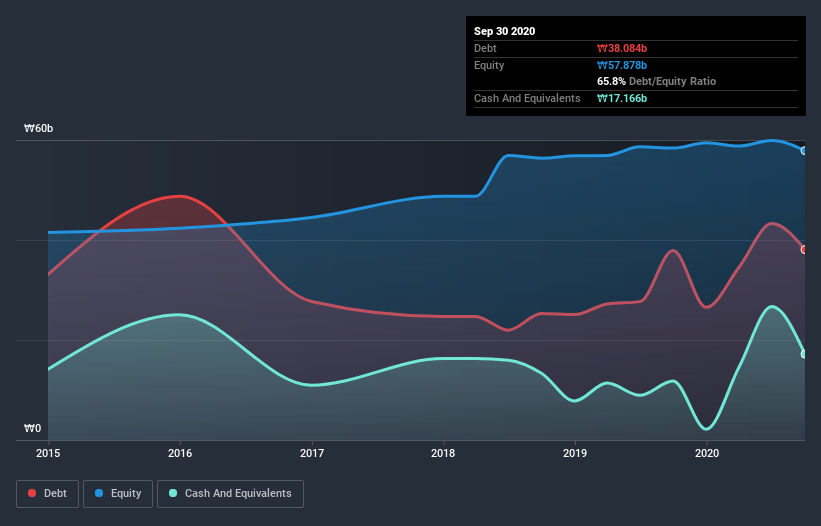
The external fund manager backed by Berkshire Hathaway's Charlie Munger, Li Lu, makes no bones about it when he says 'The biggest investment risk is not the volatility of prices, but whether you will suffer a permanent loss of capital.' So it seems the smart money knows that debt - which is usually involved in bankruptcies - is a very important factor, when you assess how risky a company is. We can see that HYUNDAI FEED Inc. (KOSDAQ:016790) does use debt in its business. But the real question is whether this debt is making the company risky.
When Is Debt Dangerous?
Generally speaking, debt only becomes a real problem when a company can't easily pay it off, either by raising capital or with its own cash flow. Ultimately, if the company can't fulfill its legal obligations to repay debt, shareholders could walk away with nothing. While that is not too common, we often do see indebted companies permanently diluting shareholders because lenders force them to raise capital at a distressed price. By replacing dilution, though, debt can be an extremely good tool for businesses that need capital to invest in growth at high rates of return. The first thing to do when considering how much debt a business uses is to look at its cash and debt together.
View our latest analysis for HYUNDAI FEED
What Is HYUNDAI FEED's Debt?
As you can see below, HYUNDAI FEED had ₩38.1b of debt, at September 2020, which is about the same as the year before. You can click the chart for greater detail. On the flip side, it has ₩17.2b in cash leading to net debt of about ₩20.9b.

A Look At HYUNDAI FEED's Liabilities
Zooming in on the latest balance sheet data, we can see that HYUNDAI FEED had liabilities of ₩46.4b due within 12 months and liabilities of ₩4.85b due beyond that. On the other hand, it had cash of ₩17.2b and ₩51.5b worth of receivables due within a year. So it can boast ₩17.4b more liquid assets than total liabilities.
It's good to see that HYUNDAI FEED has plenty of liquidity on its balance sheet, suggesting conservative management of liabilities. Due to its strong net asset position, it is not likely to face issues with its lenders. There's no doubt that we learn most about debt from the balance sheet. But it is HYUNDAI FEED's earnings that will influence how the balance sheet holds up in the future. So when considering debt, it's definitely worth looking at the earnings trend. Click here for an interactive snapshot.
Over 12 months, HYUNDAI FEED made a loss at the EBIT level, and saw its revenue drop to ₩112b, which is a fall of 5.2%. That's not what we would hope to see.
Caveat Emptor
Importantly, HYUNDAI FEED had an earnings before interest and tax (EBIT) loss over the last year. To be specific the EBIT loss came in at ₩100m. Looking on the brighter side, the business has adequate liquid assets, which give it time to grow and develop before its debt becomes a near-term issue. And the cherry on top is that its actual free cash flow was ₩5.4b with statutory profit coming in at ₩116m. This one is a bit too risky for our liking. The balance sheet is clearly the area to focus on when you are analysing debt. However, not all investment risk resides within the balance sheet - far from it. Case in point: We've spotted 5 warning signs for HYUNDAI FEED you should be aware of, and 2 of them make us uncomfortable.
If you're interested in investing in businesses that can grow profits without the burden of debt, then check out this free list of growing businesses that have net cash on the balance sheet.
When trading HYUNDAI FEED or any other investment, use the platform considered by many to be the Professional's Gateway to the Worlds Market, Interactive Brokers. You get the lowest-cost* trading on stocks, options, futures, forex, bonds and funds worldwide from a single integrated account. Promoted
If you're looking to trade CANARIABIO, open an account with the lowest-cost platform trusted by professionals, Interactive Brokers.
With clients in over 200 countries and territories, and access to 160 markets, IBKR lets you trade stocks, options, futures, forex, bonds and funds from a single integrated account.
Enjoy no hidden fees, no account minimums, and FX conversion rates as low as 0.03%, far better than what most brokers offer.
Sponsored ContentNew: AI Stock Screener & Alerts
Our new AI Stock Screener scans the market every day to uncover opportunities.
• Dividend Powerhouses (3%+ Yield)
• Undervalued Small Caps with Insider Buying
• High growth Tech and AI Companies
Or build your own from over 50 metrics.
This article by Simply Wall St is general in nature. It does not constitute a recommendation to buy or sell any stock, and does not take account of your objectives, or your financial situation. We aim to bring you long-term focused analysis driven by fundamental data. Note that our analysis may not factor in the latest price-sensitive company announcements or qualitative material. Simply Wall St has no position in any stocks mentioned.
*Interactive Brokers Rated Lowest Cost Broker by StockBrokers.com Annual Online Review 2020
Have feedback on this article? Concerned about the content? Get in touch with us directly. Alternatively, email editorial-team (at) simplywallst.com.
About KOSDAQ:A016790
Weak fundamentals or lack of information.
Market Insights
Community Narratives


